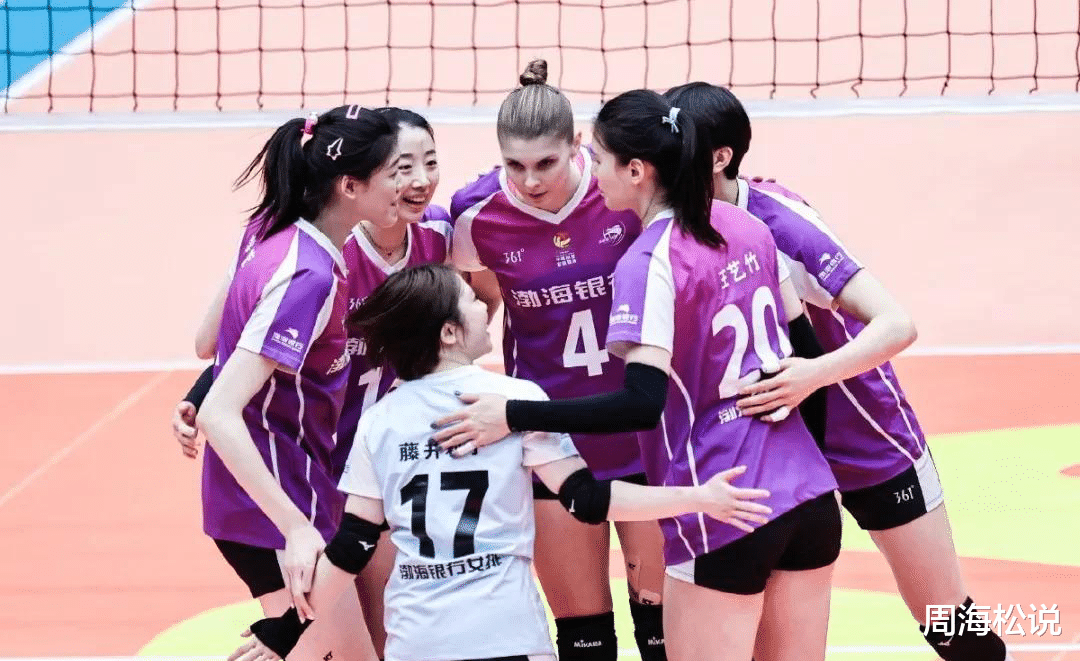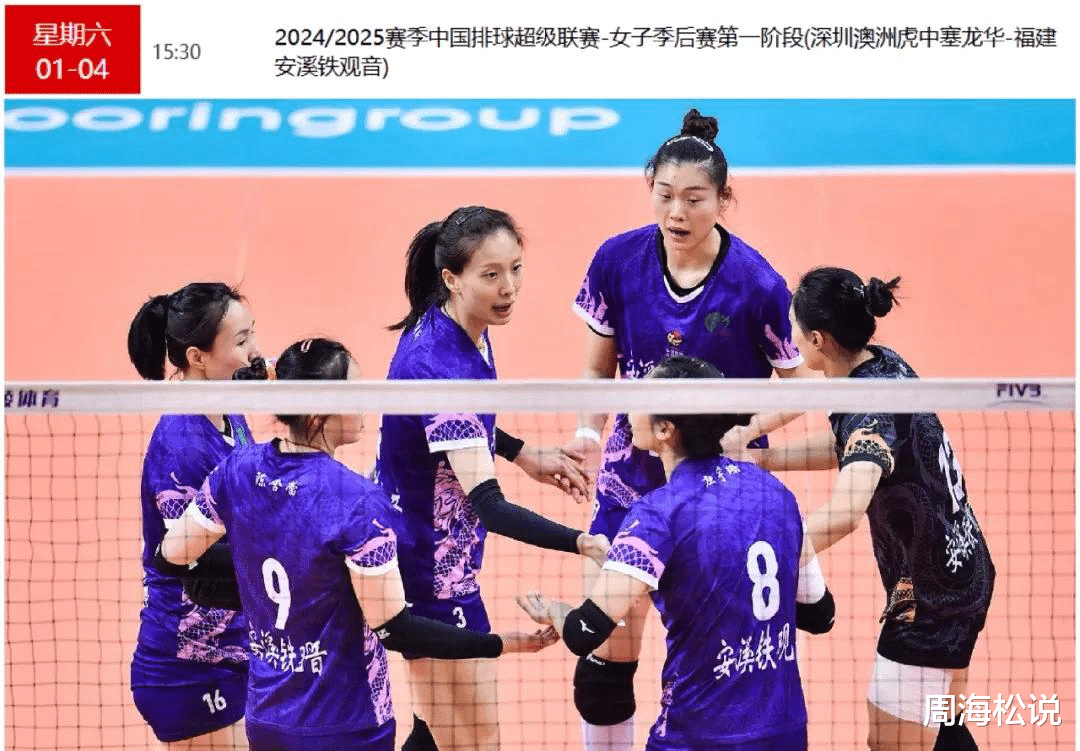The 16th round of the A-level playoffs in the Chinese Women's Volleyball Super League is about to begin, and there are quite a few highlights in this round. The match between Shanghai and Jiangsu teams is the most anticipated, as Shanghai's main player, Fedorovtseva, suddenly left the team, leaving everyone wondering what will happen next.
Shanghai has been having a tough time recently, with Fedorovtseva's departure significantly weakening the team's offensive power. Now, they can only rely on two players, Yang Hui and Zhong Hui, to play the main attacking positions, which puts a lot of pressure on them.
The coaching staff of the Shanghai team is also trying to adjust their tactical approach, as previous tactics were designed around Fedorovtseva. They now need to re-plan their offensive routes, which is not easy to adapt to on short notice.
There have been no significant changes in other positions within the team. The second setter, Liu Yanhan, has been performing steadily, and the blocking coordination between the vice attackers, Yang Jie and Zhang Xinyan, has been quite默契. However, concerns remain regarding the main attacking position.
Although young, Yang Hui is technically comprehensive, and her performance has been gradually improving, especially in defense, where she has become more stable in receiving serves.
Zhong Hui has more experience and performs well under pressure in critical moments. However, her offensive power is somewhat lacking compared to Fedorovtseva, which may affect the team's scoring efficiency.
The substitute players are also training hard, ready to step up at any moment, as the physical exertion during the playoffs is considerable, making rotations necessary.
Coach Wang has been emphasizing the importance of maintaining a positive mindset, urging the players not to lose confidence due to lineup changes and to believe in their abilities.
On the Jiangsu side, the situation is more optimistic, with the return of three key players: Diao Linyu, Gong Xiangyu, and Ni Feifei. This has significantly boosted the team's overall strength.
Diao Linyu's second pass is distinctive, with high cooperation默契 with her teammates, particularly in fast attack combinations with Gong Xiangyu, which often result in beautiful offensive plays.
Gong Xiangyu's return has greatly aided Jiangsu's offense, with powerful spikes and varied techniques that put significant pressure on opponents' defenses.
Ni Feifei is the team's defensive safeguard, covering a large area and frequently defusing opponents' strong attacks, giving her teammates more confidence when attacking.
The return of these three national team players has indeed brought significant changes to the team, but the short-term adaptation is also a challenge, as they have not trained or played with their teammates for some time.

Jiangsu's head coach, Cai Bin, is experienced in such situations and will adjust the lineup based on the actual conditions of the game, avoiding rashly putting all the main players on the court at once.
Other team members have also maintained good form during this period, especially the young player Zhang Shiqi, whose recent performances have become increasingly stable.
Jiangsu has also adjusted its training program, adding more cooperative training content to help the returning players integrate into the team more quickly.
Tianjin has been in great form recently, with Li Yingying's offensive firepower and Wang Yuanyuan's blocking providing solid support, resulting in a well-structured team performance.
Beijing lost their last match against Shandong in five sets, exposing some issues, particularly in handling critical points, where they still lack maturity.
The gap in strength between the two teams is not significant; it all comes down to who performs more consistently and makes fewer mistakes, which could determine the direction of the game.
Tianjin's advantage lies in their more cohesive overall cooperation, with precise positioning and support on the court, making their defensive system difficult to breach.
While Beijing has solid technical skills, they have made quite a few mistakes in recent matches. If this issue is not resolved, they may struggle against Tianjin.
Both coaches are experienced, and their tactical adjustments during the game will be interesting to watch, as it remains to be seen who can make better decisions at crucial moments.
The atmosphere on the court is sure to be tense, as this is the playoff stage, where every game could impact the final rankings.
Fans are also eagerly anticipating this match, as previous encounters between the two teams have been exciting, always delivering high-level competition.
Duan Fang and Hu Mingyuan from Liaoning are the team's offensive core, and their performance directly affects the outcome of the game. Their state in this match is crucial.
Shandong has been in high spirits recently, especially Yang Hanyu's performance at the net, where her blocking often causes significant trouble for opponents.

Both teams have a strong playing style, especially in net contention, promising many exciting blocking duels.
Liaoning's advantage lies in the variety of their offensive changes, with other position players besides the main attackers also possessing decent scoring capabilities.
Shandong's defensive system is relatively complete, with stable performances from the reception position players, resulting in rare major fluctuations in their games.
Both teams have solid substitute lineups that can be deployed at critical times, an important factor in the playoff stage.
The pace of the game may be relatively fast, as both teams enjoy quick counterattacks, which places high demands on physical fitness.
Coaching commands on the sidelines will also be crucial, as tactical adjustments and personnel rotations during the game could influence the final outcome.
Shenzhen's ability to maintain their A-level status is largely due to the outstanding performance of their foreign players, who have provided significant offensive support.
Although Fujian's overall strength is relatively weaker, they have a strong desire to win and give their all in every match.
This match has been selected for live broadcast by CCTV, indicating a high level of interest, and both teams will go all out to perform well.
Shenzhen's defensive counterattack is well-executed, especially in blocking and defensive transitions, with increasingly默契 coordination among the players.
Fujian's young players have made significant progress this season, though they lack experience, their playing style is energetic.
Both head coaches have made thorough preparations before the game, studying the opponents' characteristics and devising corresponding tactical approaches.
The outcome of the match is not the most important thing; what matters is showcasing their unique features and demonstrating the team's spirit.
The live broadcast of this match will also allow more viewers to learn about the women's volleyball league, contributing positively to the promotion of volleyball sports.